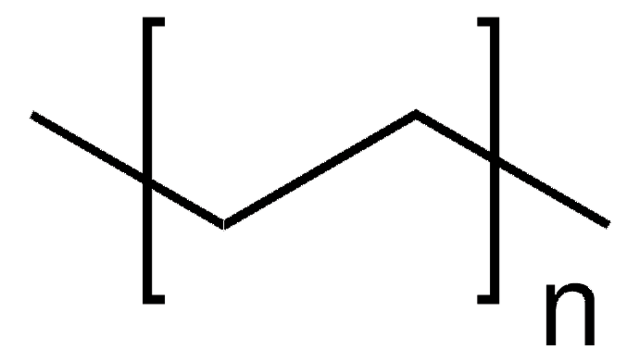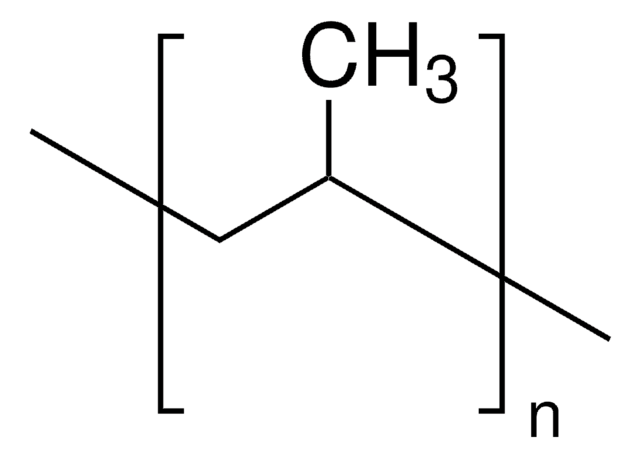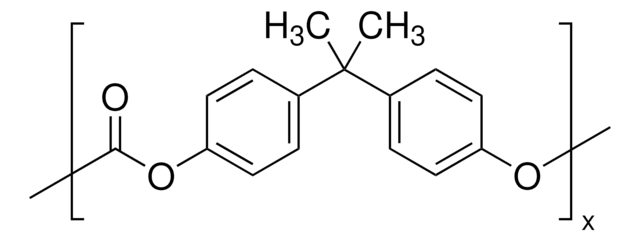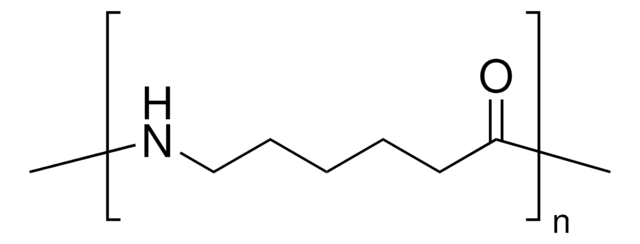182621
Poly(vinyl chloride)
analytical standard, average Mw 85,000 (Typical), average Mn 40,000 (Typical)
Sinónimos:
PVC
Iniciar sesiónpara Ver la Fijación de precios por contrato y de la organización
About This Item
Fórmula lineal:
(CH2CHCl)n
Número de CAS:
MDL number:
UNSPSC Code:
41116107
PubChem Substance ID:
NACRES:
NA.24
Productos recomendados
grade
analytical standard
Quality Level
form
powder
mol wt
average Mn 40,000 (Typical)
average Mw 85,000 (Typical)
technique(s)
gel permeation chromatography (GPC): suitable
density
1.4 g/mL at 25 °C (lit.)
format
neat
SMILES string
ClC=C
InChI
1S/C2H3Cl/c1-2-3/h2H,1H2
InChI key
BZHJMEDXRYGGRV-UHFFFAOYSA-N
¿Está buscando productos similares? Visita Guía de comparación de productos
General description
Poly(vinyl chloride) [PVC] is a polymer which is mostly prepared from vinyl chloride monomer. In most cases PVC is mixed with heat stabilizers, lubricants, plasticizers, fillers, and other additives.
Application
Labile chlorines of poly (vinyl chloride) was used to perform to graft copolymerize butyl acrylate and 2-ethyl hexyl acrylate using atom transfer radical polymerization method, followed by gel permeation chromatography (GPC) to identify the traces of graft copolymer samples.
Storage Class
11 - Combustible Solids
wgk_germany
WGK 3
flash_point_f
Not applicable
flash_point_c
Not applicable
ppe
dust mask type N95 (US), Eyeshields, Gloves
Choose from one of the most recent versions:
¿Ya tiene este producto?
Encuentre la documentación para los productos que ha comprado recientemente en la Biblioteca de documentos.
Los clientes también vieron
Poly (vinyl chloride)
Allsopp, Michael W., and Giovanni Vianello.
Ullmann's Encyclopedia of Industrial Chemistry, 28, 441-468 (1992)
Graft copolymerization of butyl acrylate and 2-ethyl hexyl acrylate from labile chlorines of poly (vinyl chloride) by atom transfer radical polymerization.
Bicak, Niyazi, and Mesut Ozlem.
Journal of Polymer Science Part A: Polymer Chemistry, 41.21, 3457-3462 (2003)
Christopher B Stipe et al.
Applied spectroscopy, 66(11), 1286-1293 (2012-11-14)
Airborne silica dust (quartz) is common in coal mines and represents a respiratory hazard that can lead to silicosis, a potentially fatal lung disease. With an eye toward developing a portable monitoring device for rapid analysis of silica dust, laser-induced
T D Ambrisko et al.
British journal of anaesthesia, 110(2), 305-310 (2012-11-21)
In a previous study, the authors found a large bias (50%) for lithium (LiDCO) compared with thermodilution cardiac output measurement methods in ponies receiving i.v. infusions of xylazine, ketamine, and midazolam. This prompted the authors to examine the effect of
Hong Wang et al.
Environmental science & technology, 46(21), 11566-11574 (2012-10-11)
Opportunistic pathogens represent a unique challenge because they establish and grow within drinking water systems, yet the factors stimulating their proliferation are largely unknown. The purpose of this study was to examine the influence of pipe materials, disinfectant type, and
Nuestro equipo de científicos tiene experiencia en todas las áreas de investigación: Ciencias de la vida, Ciencia de los materiales, Síntesis química, Cromatografía, Analítica y muchas otras.
Póngase en contacto con el Servicio técnico





